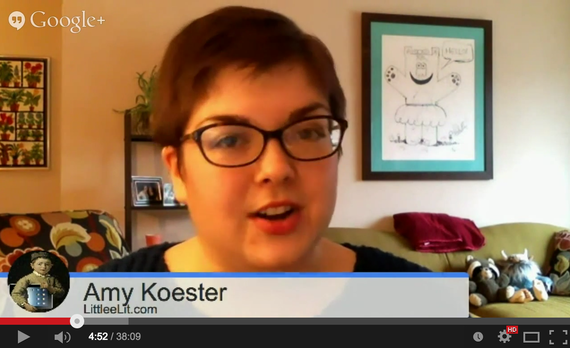Since my company started partnering with libraries, I have learned more about the incredible number of online resources they offer to patrons. Foreign language classes? Check. Homework help? That, too. Live streaming videos? Yes, and this is just the beginning of the list for many libraries.
And for parents of little kids, libraries offer age-specific storytimes, LEGO builds, movie nights, and learning activities ranging from science to sports. Libraries provide programs to meet families where they are, and to expand our collective horizons. And so to Amy Koester, my recent Experts on Air guest and editor at Little eLit, it is a natural progression for children's librarians to gain expertise in new media. Little eLit is a crowd-sourced, grassroots network of librarians and educators from around the country who share learnings and resources about new media with one another.
Amy and I discussed a lot of topics! You can watch the full video here:
At a high level, I enjoyed Amy sharing her logic for why children's librarians in this digital age should become "media mentors" for their communities:
Librarians are already committed to promoting early literacy.
Almost every library we visit has long been committed to promoting school readiness and literacy from ages birth to five. From Every Child Ready to Read to 1000 Books Before Kindergarten, the movement is afoot to create communities of little readers. Technology is an important tool in that movement.
As Amy notes, there is "still a cultural viewpoint that [all] screen time universally is passive." Children's apps are abundant, and while many are less engaging, "we're promoting apps and digital stories that have interactive components. So it's not just about playing with the app, but it's about facilitating a relationship with the child and the adult." Librarians can use this expertise to provide families with another tool to promote early literacy.
Families are already using technology... a lot.
Families might not all have tablets, but they almost all have mobile phones. And for Amy and other children's librarians, this means they can help families make even better use of these devices. As Amy said, "We want to give families who come to the library every tool possible to promote early literacy with their children. Books, oral storytelling, children's stories and nursery rhymes are all tools. New media and technology are tools as well. The fact that families have these devices and could potentially use them for positive early reading with their children, that's something I want to be able to facilitate."
This is not to say that Amy and other Little eLit librarians haven't encountered objections. Here are some she has encountered: Do we know enough about what is a positive way to use this technology to be able to confidently recommend it to our families? Do we have a responsibility to provide access to these materials if the majority, or even part of our population, won't have access to it at home? Don't we have enough to accomplish already for promoting early literacy already to these young children and their families, without adding another component?
But these objections are largely being laid to rest, according to Amy. It appears that this movement is reaching a tipping point. Whereas Little eLit "started with a group of dedicated professionals, and initially, there was a lot of questioning from a large proportion of the profession," today it seems they have made their case sufficiently.
Serving families remains a constant.
My favorite thing Amy said in our interview was, "What doesn't evolve is our dedication to serving families." For any person who has ever visited the children's section of a library, this resonates. Librarians serve families, and they can help those families better navigate and utilize that technology for positive reading experiences with kids.
At the heart of Amy and her colleagues' work is the question, "How do we support 21st century families?" As she noted, families want to do what is best for their children. The librarians of Little eLit are supporting families in that quest. We are working with a handful of Little eLit contributors for our service, Beanstack, and I am consistently floored by their dedication to finding what will work for families. As one of our curators said to me, "even the most tech savvy parent can feel overwhelmed by the choice in apps available for their kids."
Librarians serve families, and families are using technology. Amy's logic continues, "So the library should do what it can to serve families where they are. If they want to know what's a good app, we should at least know of a resource where to find that information. Fundamentally that's what we do as libraries." Indeed, and we are so pleased that the contributors to Little eLit are even providing a primer on the topic for librarians and educators everywhere.
This was originally posted on the Zoobean blog.
